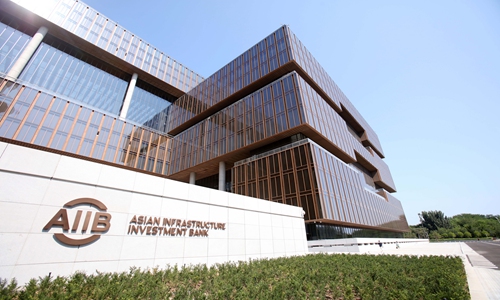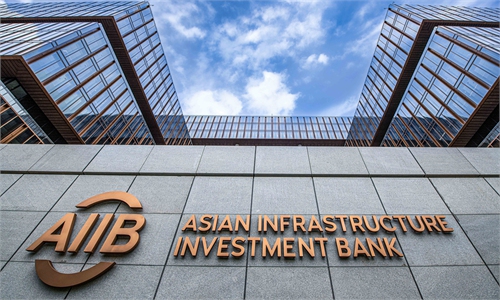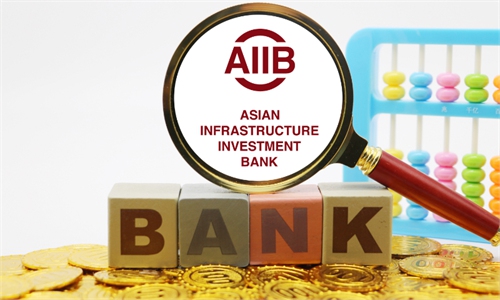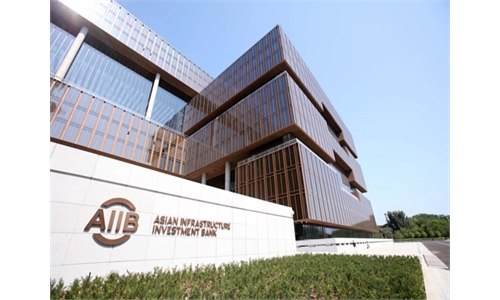
The new site of AIIB headquarters near the Olympic Forest Park in Beijing Photo: cnsphoto
The Asian Infrastructure Investment Bank (AIIB) has ambitious plans to expand its global presence, starting with its new interim operational hub in Abu Dhabi in the United Arab Emirates (UAE), AIIB President Jin Liqun said on Wednesday, underscoring multilateralism and sustainable infrastructure.
"Rapid growth is the catalyst for opening an office that helps bring our bank closer to [its] clients and the front lines of its business," Jin, also chair of the board of directors, told a virtual media briefing for the bank's seventh annual board meeting. He cited a portfolio of 191 projects in 33 countries and regions and $36 billion in project financing.
Based in Beijing, the AIIB started with 57 founding members in 2016, and its membership has grown to 105.
The new hub is envisioned to provide geographical proximity to global financial centers and connectivity with the international infrastructure ecosystem, vital to maintaining the bank's optimal commercial momentum, according to Jin. "It makes a lot of sense for us to have this first hub established in the UAE."
Plans for the new interim operational hub, its first overseas office, were first revealed by the bank in July.
The UAE was one of the AIIB's founding members. As one of the region's fastest-growing economies, the UAE has been actively promoting a green transition.
The AIIB's sixth annual meeting was held in Dubai in late October 2021. This was the first time that the bank held its annual meeting in the Middle East.
The seventh annual meeting, the bank's flagship event, was scheduled virtually for Wednesday and Thursday.
The bank president also offered clues, albeit vague, about the AIIB's expansion other than the UAE hub.
"Set up in the 21st century, we would have selected hubs in the member economies moving forward. The first hub would help us gain experience, which can inform decision-making in the future. So the future hubs would have to be decided based on our experience and the needs of our clients," he said.
In addition to expansion ambitions, the AIIB head talked extensively about multilateralism, which the bank has championed despite geopolitical tensions and other headwinds.
The 20th National Congress of the Communist Party of China has just concluded, and what is the most relevant to the AIIB is the message that China would continue to embrace multilateralism, Jin said.
"China would continue to work with other members of the international community, so we are looking forward to China's continued support for this bank as the biggest shareholder. We believe that we would be able to work with China and any other big shareholders of this institution to provide vital support to those members who need our resources most."
In response to a question from the Global Times, Jin touched on India as a major borrower of the AIIB.
India is the number two shareholder of this bank, and India is a large country with a large population, with high demand for infrastructure, he said, disclosing that "we have been working very closely with Indian authorities and also the private sector."
As an increasing number of the bank's members propose development projects for its financing, the AIIB will have to appropriately allocate its resources to meet the needs of people in India and the people of other countries, according to Jin.
Describing it as a tough job, he said that "with limited resources, we want to do our best."
Current growth woes are seen as putting the bank in a more prominent role in underpinning infrastructure development globally.
Recent rate hikes and economic difficulties are indicative of the turbulence of the cyclical economic situation, Jin said, noting that the current pressure would have some adverse impact on many countries' ability to continue their basic infrastructure development projects.
In a sign of downside risks, the IMF earlier in October lowered its 2023 global economic growth forecast to 2.7 percent from its July prediction of 2.9 percent, citing high energy and food costs and rate hike pressures, and it warned "the worst is yet to come."
Climate-related commitments make up a big part of the AIIB's financing plans despite mounting growth concerns.
China, India, Indonesia and other major Asian shareholders of the bank remain committed to implementing the Paris Agreement, the AIIB head said, stressing that "it will be a lot easier for us to mobilize more efforts to support the net zero transition."
China comes across as patently ambitious on its net zero push. The country is not going to export coal technology in its assistance programs for other countries.
Last year, the AIIB's climate finance totaled $2.9 billion, or 48 percent of its entire approved financing, an increase of 41 percent from the previous year, the bank said, and it has committed to making climate finance half of its approved projects by 2025.



